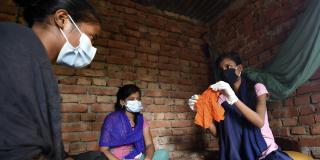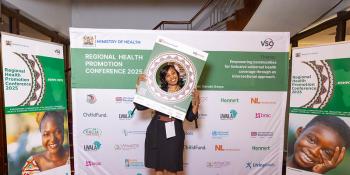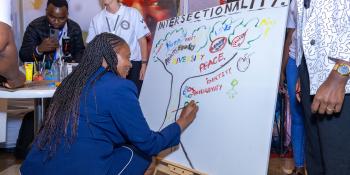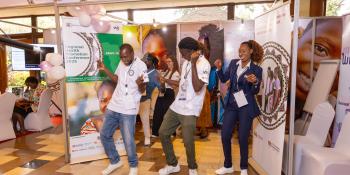
This article first appeared in Nepali Times
Nepal must tackle menstrual hygiene and taboos during the lockdown, or risk losing a generation of girls.
Period stigma has long blighted the lives of young women and girls in Nepal, but the pandemic is making things worse. If action isn’t taken to help girls menstruate safely, hygienically, and with dignity, Nepal’s gradual progress in tackling taboos and stigma around menstruation risks being undone.
Families are spending long days, weeks, months indoors, and the continued lockdown is reinforcing harmful practices and stigma around menstruation. We have all come to realise the importance of routine hand-washing, but hygiene does not stop there. Menstruation does not stop during a pandemic, nor does the intense stigma associated with it in Nepal.
Even without the pressures of the lockdown, many girls and women in poor, rural parts of Nepal simply do not have access to clean running water and soap. They also do not have menstruation pads, and even when they do many find themselves facing stigma in the household, making their day-to-day lives all the more difficult.
In communities where VSO works chhaupadi still persists despite the government’s ban on so-called ‘period huts’, and a three-month prison sentence and fine for forcing girls to menstruate in huts. But some are still sent to caves and other locations which put them at risk.
To remain ‘clean’, girls are forbidden to touch communal objects in the household. Menstruation untouchability is still practiced and promoted, and even the Nepali word nachhuni literally means ‘untouchable’.
Women and girls are separated and not allowed to touch and enter kitchen and prayer room. They cannot touch male members of the household, and there is much mental pressure by the family and community members to maintain untouchability norms and practices. Failure to abide by them sometimes leads to ostracisation.
At the individual level, it is a painful experience and there are long-term psychological effects of period stigma on girls’ self-esteem, especially among trans and disabled women and girls who face double marginalisation. Some of these women make up our frontline healthcare workers during the time of Covid-19, leading to increased anxiety during the lockdown.
Added to all this, the economic crisis is leaving young women and girls unable to afford menstruation products, particularly as prices for sanitary pads have spiked.
Last year, the government committed to providing every girl with sanitary pads to help them continue to go to school in a dignified way and succeed in studies. This year, we reached many girls with the products, helping them stay in school and realise their dreams.
This year the government has also allocated funding to provide sanitary pad distribution to schoolgirls. But with schools closed across Nepal for nearly six months now, the goal of reaching every schoolgirl with sanitary pads has been badly interrupted. We are now hearing that girls are resorting to makeshift solutions, risking infection and complications.
The pandemic has disrupted every facet of life, but the fight to realise women’s rights to menstruate safely and with dignity must continue. Under the lockdown, VSO is providing hygiene kits to some 4,000 girls across rural Nepal, especially in areas where menstruation taboos and stigma persist.
The kits include soap, chlorine wash, underwear and a hygiene kit bag. Prior to the lockdown, VSO also trained over 2,000 young women and girls across four districts to make reusable sanitary pads, a skill which many have put to good use under lockdown.
The Menstrual Hygiene Management (MHMPA) Alliance Nepal is a national network supporting over 80 initiatives to tackle period stigma in the country which works to shape policy and campaign for change. Its activities are constrained under the lockdown, but the mission to end period stigma across Nepal will not stop.
The Nepal government has shown its commitment to end period stigma and other forms of gender inequality. While we fight Covid-19 together, we must also use this moment to ensure the promises we have made to young girls are kept throughout the pandemic and beyond.
With the virus continuing to spread in Nepal and schools not opening any time soon, we are calling on national and local governments to honour their original commitment and ensure girls receive free menstrual products even when they are not in school.
We have come a long way in improving the rights of women and girls in Nepal, legislating for increased participation of women in politics, while improving their rights in the home. Tackling period stigma is a fundamental part of moving towards a more equal society, and overcoming the barriers women face in public life.
We can be proud of the progress we have made in challenging harmful practices like chhaupadi – and by working together as communities, civil society and government we can make sure that the pandemic does not hinder, or even reverse, our progress.
We must use this moment to leverage the partnerships we have built in recent years between civil society and government to ensure that women and girls are not left behind today, and can thrive when the pandemic eventually ends.
Read more

In photos: Our Regional Health Promotion Conference 2025
Check out some of our favourite photos from Regional Health Promotion Conference (RHPC25). This event sought to reimagine Universal Health Coverage through the lens of intersectionality.

Using intersectionality to create healthy beginnings and hopeful futures
World Health Day brings global attention to the urgent need to end preventable maternal and newborn deaths. Learn more about how our Regional Health Promotion Conference is tackling these issues head on.

Highlights from the Regional Health Promotion Conference 2025
The Regional Health Promotion Conference 2025 reimagined Universal Health Coverage (UHC) through the lens of intersectionality, by bringing together experts from across East Africa and beyond.
